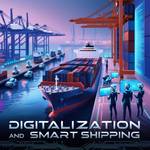Blockchain in Shipping: Revolutionizing Global Supply Chains
Blockchain technology, initially developed as the backbone of cryptocurrencies like Bitcoin, is now making waves in the shipping industry. With its ability to provide secure, transparent, and tamper-proof records, blockchain is poised to revolutionize global supply chains, addressing some of the most persistent challenges in maritime logistics, including inefficiencies, fraud, and lack of transparency.
What is Blockchain?
Blockchain is a decentralized, distributed ledger technology that records transactions across multiple computers in such a way that the registered data cannot be altered retroactively. Each block in the chain contains a list of transactions, and once a block is completed, it is added to the chain in chronological order. This creates an immutable record that is accessible to all participants in the network, ensuring transparency and security.
In the context of shipping, blockchain can be used to track the movement of goods, verify documentation, and facilitate payments, all within a secure and transparent framework.
How Blockchain is Transforming Shipping
The shipping industry is complex, involving multiple stakeholders, including shippers, carriers, freight forwarders, customs authorities, and financial institutions. Traditionally, this complexity has led to inefficiencies, delays, and opportunities for fraud. Blockchain technology offers solutions to these challenges by enabling:
Enhanced Transparency and Traceability
- One of the most significant advantages of blockchain in shipping is its ability to provide a transparent and traceable record of every transaction and movement within the supply chain. From the moment a product leaves the manufacturer to its final delivery, every step can be recorded on the blockchain. This level of transparency helps build trust among stakeholders and ensures that goods are handled correctly and in compliance with regulations.
Streamlined Documentation
- The shipping industry is heavily reliant on documentation, such as bills of lading, certificates of origin, and customs declarations. These documents are often processed manually, leading to delays and errors. Blockchain allows for the digitization of these documents, making them easily accessible and verifiable. Smart contracts—self-executing contracts with the terms of the agreement directly written into code—can further automate processes, reducing the need for intermediaries and speeding up transactions.
Fraud Prevention
- Fraud is a significant concern in the shipping industry, whether it involves counterfeit goods, document forgery, or financial fraud. Blockchain's immutable ledger makes it nearly impossible to alter records without detection, significantly reducing the risk of fraud. For example, counterfeit goods can be tracked and traced throughout the supply chain, ensuring that only authentic products reach the end consumer.
Cost Reduction
- By eliminating intermediaries and automating processes through smart contracts, blockchain can significantly reduce operational costs. The reduction in paperwork, delays, and disputes also contributes to cost savings. Additionally, the transparency and efficiency provided by blockchain can lead to lower insurance premiums, as the risk of fraud and errors is minimized.
Improved Supply Chain Efficiency
- Blockchain enables real-time tracking and data sharing across the entire supply chain, allowing for better coordination and decision-making. Delays can be quickly identified and addressed, and all parties involved can access the same data, reducing misunderstandings and miscommunications. This increased efficiency can lead to faster delivery times and improved customer satisfaction.
Real-World Applications of Blockchain in Shipping
Several initiatives and pilot projects are already demonstrating the potential of blockchain in the shipping industry:
TradeLens: A blockchain-based platform developed by Maersk and IBM, TradeLens aims to digitize global trade by providing a secure and transparent platform for all supply chain stakeholders. The platform has gained significant traction, with major carriers, port operators, and customs authorities joining the network.
CargoX: CargoX is an independent blockchain platform that focuses on providing blockchain-based document transfer solutions, particularly for bills of lading. The platform offers a secure, efficient, and cost-effective way to manage shipping documents, reducing the reliance on physical paperwork.
Everledger: Originally developed to track the provenance of diamonds, Everledger is now applying its blockchain technology to the shipping industry. By creating a digital record of a product’s journey, Everledger helps ensure authenticity and compliance, particularly for high-value goods.
Marine Transport International (MTI): MTI has developed a blockchain-based platform that aims to improve transparency and efficiency in container logistics. By providing real-time visibility into container movements and automating key processes, MTI's platform helps reduce costs and improve service levels.
Challenges and Considerations
While the potential benefits of blockchain in shipping are significant, the technology is not without its challenges:
Scalability
- Blockchain networks, particularly those that are public and decentralized, can face scalability issues as the volume of transactions increases. Ensuring that blockchain systems can handle the demands of global shipping is essential for widespread adoption.
Interoperability
- The shipping industry involves a vast array of stakeholders, each with their own systems and processes. Ensuring that blockchain solutions can integrate and communicate with existing technologies and platforms is critical for success.
Regulatory and Legal Hurdles
- The adoption of blockchain in shipping requires alignment with regulatory and legal frameworks, which can vary significantly between countries. Establishing global standards and ensuring compliance will be key to the successful implementation of blockchain in the maritime industry.
Adoption and Implementation Costs
- The initial costs of implementing blockchain technology can be high, particularly for smaller companies. Additionally, there is a learning curve associated with the adoption of new technologies. Stakeholders will need to weigh the long-term benefits against the short-term costs and challenges.
Data Privacy and Security
- While blockchain is inherently secure, the handling of sensitive data, particularly in public or consortium blockchains, raises concerns about privacy and data protection. Balancing transparency with the need to protect sensitive information will be an ongoing challenge.
The Future of Blockchain in Shipping
Despite the challenges, the future of blockchain in shipping looks promising. As the technology matures and more stakeholders recognize its potential, we can expect to see wider adoption and integration across the industry. Blockchain has the potential to become a standard tool in global supply chain management, providing the transparency, efficiency, and security that the shipping industry needs to thrive in an increasingly complex and interconnected world.
Conclusion
Blockchain technology is set to revolutionize the shipping industry by providing a secure, transparent, and efficient way to manage global supply chains. From enhancing transparency and traceability to reducing fraud and operational costs, blockchain offers numerous benefits that can address many of the industry's longstanding challenges. While there are hurdles to overcome, the potential for blockchain to transform shipping is undeniable, making it a critical area of focus for the future of maritime logistics.



















